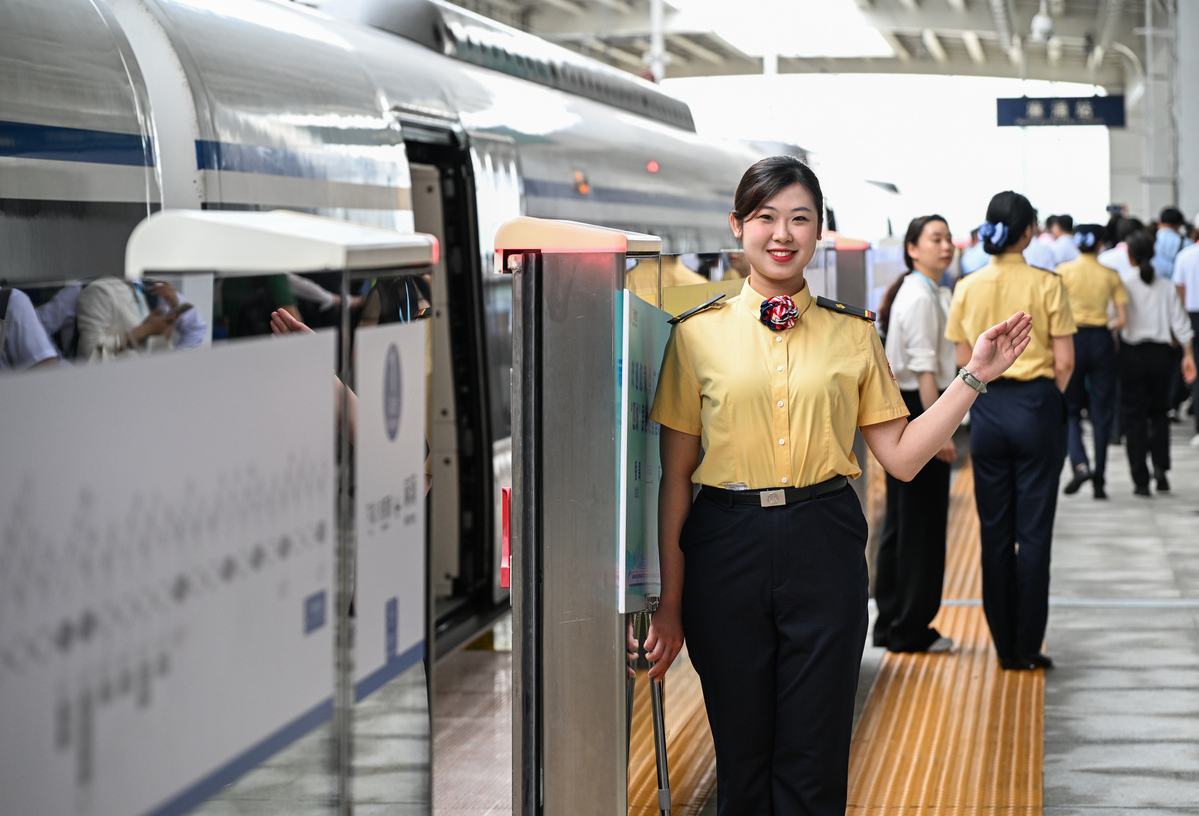New rail links enable convenient regional commutes

A staff member welcomes passengers for the intercity railway at Machong Station in Dongguan, south China's Guangdong province, May 26, 2024. (Photo/Xinhua)
Two new intercity railways linking the cities of Guangzhou, Foshan and Dongguan in Guangdong province were put into use on Sunday, redefining regional travel with their unique subway-style operation and enabling flexible commutes between key cities in the Guangdong-Hong Kong-Macao Greater Bay Area.
The Guangzhou-Foshan South Ring and the Foshan-Dongguan intercity railways, which connect with the already operational Dongguan-Huizhou and Foshan-Zhaoqing intercity railways, form a 258-kilometer railway corridor that serves as a vital east-west artery in the Greater Bay Area. Trains can run at a maximum speed of 200 kilometers per hour, with more direct trains and shorter travel times, according to the Guangzhou Metro Group, which operates the lines.
Lin Feiming, Party chief of the Guangdong Department of Transport, said, "In addition to increasing the happiness of visitors in their travels, the improved connectivity will enhance regional coordinated development, playing a crucial role in strengthening the core engine function of the Greater Bay Area as a bridge between different areas."
Also, better connectivity supports the implementation of the provincial strategic project to facilitate coordinated development between urban and rural areas, Lin said.
Starting from Panyu Station in Guangzhou, the capital of Guangdong, passengers can arrive in Foshan or Dongguan within 30 minutes, and can reach Zhaoqing or Huizhou in just one hour.
The minimum fare between Guangzhou and Zhaoqing, and from Guangzhou to Huizhou intercity stations, is five yuan (69 US cents), with a maximum one-way fare of 153 yuan.
A multipayment system has been introduced, by which passengers can either buy tickets in advance on the 12306 ticket-booking platform, which is the usual practice for most passengers, or board the trains directly by scanning their regular bus or subway payment QR code or swiping transportation cards.
"It is so convenient to board the intercity train now, with just scanning the payment QR code of my digital transportation card, just like taking a subway," said Wang Xuelin, a 38-year-old woman who was going back to Huizhou from Guangzhou with her child on Sunday.
For Wang, it will take less than two hours by the intercity railway to travel from Panyu Station in Guangzhou to Xiaojinkou Station, the final stop in Huizhou.
"I will travel frequently between the two cities now" because of the convenient new link, she said.
Some netizens called the new intercity railway links "the subway of the Greater Bay Area".
Furthermore, passengers can enjoy better service and smoother transfers inside stations. For example, at Panyu Station and several subway stations in Guangzhou, specialty products including food are available so that passengers can buy in a "one-stop" manner.
With the operation of the four lines, multiple stations have implemented mutual security recognition with national railway stations, facilitating convenient and smoother transfers.
There are a total of seven stations along the intercity lines where passengers can transfer to national railway lines and to subway lines, according to the intercity railway operator.
Among them, passengers can transfer to the national railway at Foshan West Station and Dongguan West Station through convenient transfer passage, without the need for secondary security checks.
Photos
Related Stories
- Intelligent heavy-haul electric locomotive rolls off production line in C China
- China's int'l rail-sea train service handles 300,000 containers in 2024
- New factory of Coca-Cola bottler breaks ground in China's Guangdong
- First Guizhou-Vientiane train route arrives in Laos
- Over 750,000 SMEs in Guangdong employ cloud systems for higher-efficiency production
- Intercity rails in Guangdong begin trial operations
Copyright © 2024 People's Daily Online. All Rights Reserved.









